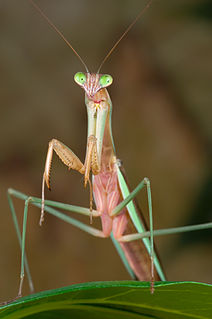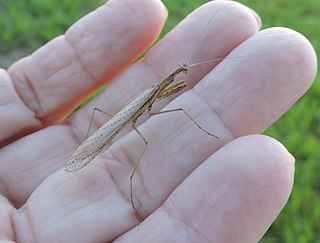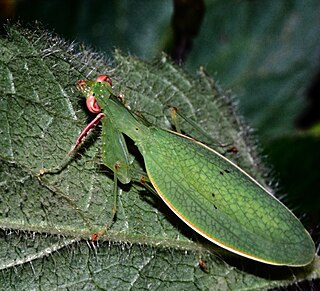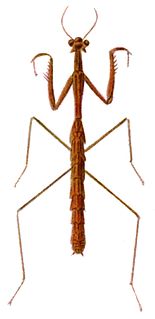
Mantidae is one of the largest families in the order of praying mantises, based on the type species Mantis religiosa; however, most genera are tropical or subtropical. Historically, this was the only family in the order, and many references still use the term "mantid" to refer to any mantis. Technically, however, "mantid" refers only to members of the family Mantidae, and not the 14 remaining families of mantises. Some of the most recent classifications have promoted a number of the mantid subfamilies to the rank of family, e.g. Iridopterygidae, Sibyllidae, Tarachodidae, Thespidae, and Toxoderidae, while other classifications have reduced the number of subfamilies without elevating to higher rank.

Hymenopodidae is a family of the order Mantodea (mantises), which contains six subfamilies. Some of the species in this family mimic flowers and are found camouflaged among them; these are called flower mantises. Their coloration is aggressive mimicry, luring prey to approach close enough to be seized and eaten.

Tenodera is a genus of mantis in the family Mantidae which contains several species of praying mantises. The species in this genus can be found primarily in Africa, Asia and Australia, but also North America.

Hymenopodinae is a subfamily of the mantis family Hymenopodidae.

Acromantinae is a subfamily of the mantis family Hymenopodidae which contains two tribes and about 13 genera.

Archimantis is a genus of praying mantis found in Australia. These species are ranging from 150 mm to 180mm, and can be quite aggressive when full adult.

Amantis is a genus of praying mantids native to Asia and the islands of the Pacific Ocean and now belongs to the monotypic tribe Amantini of the subfamily Iridopteryginae.

Sphodromantis is a large genus of praying mantises concentrated in Africa, sometimes considered a synonym of the genus Hierodula: from the same tribe, Paramantini. Outside their range especially, many share the common name African Mantis.

Rhombodera is a genus of praying mantises native to Asia and possessing common names such as shield mantis, hood mantis, and leaf mantis because of their extended, leaf-like thoraxes.

Acromantis is a genus of Asian praying mantids in the subfamily Acromantinae of the family Hymenopodidae.

Thespidae is a family of Neotropical insects in the order Mantodea. Following a major revision of this order in 2019, the old-world subfamilies Haaniinae and Hoplocoryphinae, previously placed here, have been upgraded to family level.

Toxoderidae is a family of praying mantises.
Acromantini is a tribe of mantis in the family Hymenopodidae, which contains 9 genera and 35 species:

Odontomantis is a genus of mantids in the family Hymenopodidae; species can be found in tropical Asia.

The Hierodulinae are a subfamily of praying mantids, originally used by Brunner von Wattenwyl. It was restored as part of a major revision of mantid taxonomy, and now contains genera previously placed elsewhere in the family Mantidae.

The Nanomantidae are a new (2019) family of praying mantises, based on the type genus Nanomantis. As part of a major revision of mantid taxonomy, genera and tribes have been moved here, substantially replacing the old family Iridopterygidae.

The Gonypetidae are a new (2019) family of praying mantids, based on the type genus Gonypeta. The first use of "Gonypetidae" was by Westwood and it has been revived as part of a major revision of mantid taxonomy; the subfamily Iridopteryginae having been moved here from the obsolete family Iridopterygidae. The Gonypetinae include Asian genera transferred from the obsolete taxa Amelinae and Liturgusidae.
The Chroicopteridae are a new (2019) family of praying mantids, based on the type genus Chroicoptera. The name is derived from first use, for subfamily Chroicopterinae, by Giglio-Tos and it has been revived as part of a major revision of mantid taxonomy. Some genera have also been moved here from the tribe Rivetinini, with others placed elsewhere including the subfamily Miomantinae.
Hapalomantis is a genus of mantises belonging to the family Nanomantidae.

Hoplocorypha is a genus of mantises belonging to the family Thespidae.

















